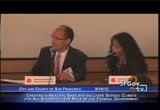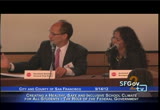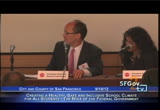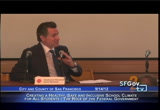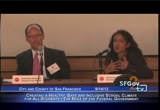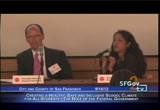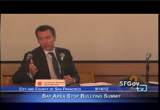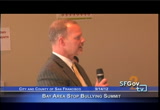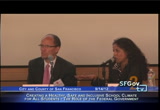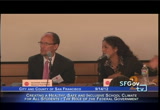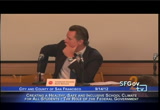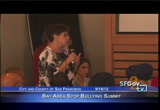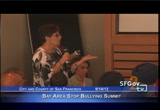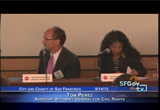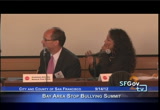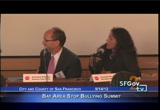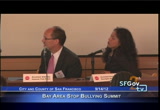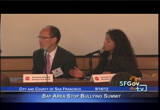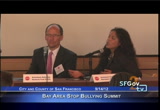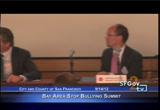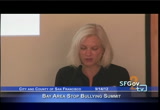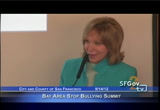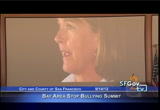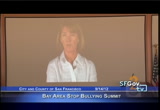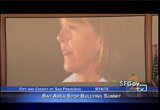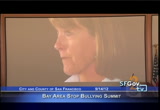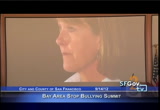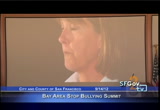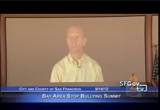tv [untitled] January 8, 2013 10:00pm-10:30pm PST
10:00 pm
year here, basically, i was doing a federal trial involving some bad things that happened, okay? i usually come in after bad things have happened. and we were picking the jury and i'll never forget it, it was about a 6 or 7-week trial, 1992 or something like that, 91, and it was remarkable to me because we did a questionnaire because the case had a lot of publicity. and i'd say 99 percent of the people noted, the potential jurors noted they have daily and meaningful contact with a person of another race or religion. and then i had another trial after this was done in another jurisdiction that shall go unnamed, and i would say there were maybe 5 percent of the jurors, potential jurors, who
10:01 pm
had had meaningful contact with a person of a different race or ethnicity and that's really what this is about. one of my least favorite words is the word tolerance because, you know, i tolerate brussel sprouts but if you simply tolerate the diversity that is america, you are going to, you are aspiring for mediocrity. when we have, and this gets back to your question, when we have leaders that embrace diversity and that build a culture that says, you know what, if you want to compete in the global economy tomorrow, pal, you've got to embrace diversity. why does coca-cola write a brief to the united states supreme court and general motors and microsoft on issues of diversity and higher education? because they know if they want to get ahead, they've got to embrace that diversity. if they want to continue to be a fortunes 50 company, there's got to embrace
10:02 pm
diversity. similarly if we want to get down to the local level and address this issue, we've got to teach our kids that the sooner that you embrace difference and understand that your muslim classmate or your seat classmate or your gay classmate or your limited english professor classmate might be tomorrow's ceo or today's best friend of yours, the better off we will be. you have a leg up, having done about 30 jury trials across this country and seen interactions between people of diverse backgrounds. >> and here we try to celebrate, not just embrace, our diversity. celebrate all our interesting diversity but also celebrate the things that bind us together.
10:03 pm
ruslyn, does can urriculum need to change or is that not yet where you are. >> the federal government can't -- 10th amendment. >> change it. >> that would be federal overreach. >> well stated. >> no, but, but, so we are not funding or digging into can urriculum in that way. but you certainly have seen superintendent caranza happened about what happens with the kinds of conversations that happen with the movie bully and there are can urriculum packages being developed. i had visions, gary, to think about how if folks decided -- and we don't play in this -- but if folks decided there could be a class on this, how you teach, life skills class, right? if we try to make a
10:04 pm
one-size fits all click approach that doesn't really take people from where they are and get them to where they need to go. i have seen life skills work well and i have seen students literally filling out mcdonald's applications in their life skills class. so you can't just quickly eradicate and we can't just think about this in an isolated silo the link, for example, that has been alluded to between discipline and bullying, they go hand in hand, how zero tolerance policies often can hurt the victim of bullyings and harassment as they react. you heard tom mention restoretive justice, right here, again, right here in this city across the bridge, and i know as superintendent talked about, you are doing amazing stuff in san francisco. tony
10:05 pm
smith in oakland has an initiative that is dealing with not just things like restoretive justice alone but positive behavioral interventions and supports. couple that with response to intervention, whole school reform strategies that work on transforming the way the school is functioning and in so doing making it a more positive culture for everybody. it brings in parental engagement in families and it has the very tough conversations, in the case of oakland i know for sure, around things like race with an african american male focus in that community because it's appropriate for that community, and the way all these things link together. so certainly bullying and harassment is an avenue into transforming the way schools work. just like discipline is an avenue into transforming the way schools work, as is standards and good assessments,
10:06 pm
it is how all these things fit together to ensure that students feel safe to learn but that what they are learning are the rigorous courses and skills and they are challenged enough to stay in school, graduate, and meet our president's goal we're going to lead the world when it comes to college graduates again. >> in our remaining 6 1/2 but i'll say 8 minutes, i want to recognize tom ammiano who walked in, tony, i'm going to put you on the spot first just because i was so upset you left us when i was mayor and we tried to keep you, but i'm so happy for oakland. but, tony, you have any comments or questions for our two esteemed panelists, particularly ruslyn who has been saying so many nice things about you. you should reciprocate. >> we also have a really big investigation going in oakland. i'm not sure -- tony is right. be nice. >> thank you, yeah, good
10:07 pm
morning, everybody. thank you very much. so we are pretty deep in an investigation about the disproportionate suspension of african american males and the reason we have been able to engage so deeply is because of the understanding that unless we take a really deep healing approach, unless we look at the root issue, bullying will persist. so we said you need to have a universal goal that you can eliminate bullying but it's really about creating a caring school community. what i would ask, this question of definition, can you, though, ask for communities to come forward with what it would look like to be, what's the vision for youth in our cities across the country, to be more articulate about the kinds of conditions we should have in our cities and the kinds of role that the elected officials have in working cross jurisdiction to say young people should feel these ways and have these kinds
10:08 pm
of opportunities in our cities. what would that look like? >> we have some models. we have some models. i do think the kind of youth voice in this conversation is remarkable and it's a place -- but it ought not be the exception, right, these are the consumers of everything we do and far too often their voices are not heard enough. in those practices, in those places that are really getting at the root cause of this, it is coming from youth, as all movements do, right, and it is ensuring that those community groups become partners with the school site to take what folks like you are trying to do and ensure that its tentacles reverberate far outside the school building. while we don't have things like a common definition we have seen, over
10:09 pm
the last 3 years, finally all states developing some state policy against bullying and harassment. three years ago we didn't have anything close to that. and it is about state leadership, not just looking at the civil rights laws for protection, but -- and it certainly is our job to vigorously enforce them -- but it is your job as superintendent to (inaudible) even where the federal civil rights laws don't protect you. so it's a case of taking what you are doing, what folks are doing across the country and putting those on places like stopbullying dwofl .org so we can scale those up around the country. >> recognizable face.
10:10 pm
>> (inaudible) and i'm also head of the san francisco commission on women and the lieutenant governor asked about data. actually we do have data on bullying in san francisco high schools, particularly bullying among lgbt girls. so for the first time this year we've incorporated data that kevin coggin and ilsa (inaudible) provided and their suicide rates are off the charts, lesbian girls in our district. it's actually from the cdy youth risk survey. i want to offer that as a resource to folks in this room and encourage you in this pursuit of data. >> thank you. >> my question centers around the point of view of a parent. four years ago my son shot
10:11 pm
himself at school. he was a victim of bullying in sacramento, california. these kinds of summits are interesting it me because i'm boots on the ground. i am in the trenches every single day and i live in sacramento so i'm at the capitol and we use the word bullying which softens the behavior. this is abuse. it is peer abuse. and our children are crying for help. and the adults who are charged with their well-being turn a blind and deaf ear to it and here's my comment. there are no consequences for failure to comply. nothing with teeth. and i have a dead child who broke under horrendous circumstances where in one of the best schools in sacramento, meraloma, breaks
10:12 pm
every record going. it is the best. and my son was perceived to be gay and the idea that you could scream out every horrendous word in front of god and everyone and no one did anything, and michael followed policy to a t tomorrow is his birthday. i should be celebrating his 21st birthday. instead, my husband and i, we mourn 4 years. we are no further along. none of our laws, they are not working. this is great. but as a parent who runs around and goes to these things to be able to say, okay, we are the most progressive state in the country and our children are dying and they are floundering. how you get it from this point
10:13 pm
up here, boots on the ground where it needs to be and what's the action plan for failure to comply. that's my question. (applause). >> first of all, thank you for sharing that. i am capable of stepping in your shoes and appreciating how the unspeakable loss that you have just shared with us and i'm very, very grateful for you. regretablely, i have had too many conversations with parents, including some of the parents that were featured in the movie --. >> (inaudible) collaborative. it's like an underground railroad because nobody, no one has suffered like we have. the white house summit, both of
10:14 pm
them, i knew what was going to be said because we all, we are each other's advocates. we are brothers and sisters in grief. we know what it feels like to have our children destroyed over things that we love and cherish about them. >> right. you referenced again what i referred to often as the appalling silence of good people that, as you recall, were dr. king's words from the birmingham jail. i've seen that all the time, people who are i think in their core good people who don't know what to do who tend to send the paradigm that boys will be boys and girls will be girls and we're trying to shift that paradigm. and that's why in okahenapen we have an accountability document that calls for --.
10:15 pm
>> (inaudible) with the idea, like i said, there is not a state going that we don't have a parent that has a dead child. we are dragging everybody to the party because at what point do we say, we can't even say, kids are dying. hundreds and hundreds of children have died when this should be the best times of their life and our most sensitive, compassionate, empathetic, our children are not surviving their childhood. >> one thing i've learned in my line of work, and again i want to thank you for your remarks and your doggedness, civil rights is about persistence. you exude persistence. i have attempted to live a persistent life. the civil rights act of 1964 was first introduced in 1948, took a little while. the hate crimes of 2009 was first introduced in
10:16 pm
96, took some time. we are not backing off this. i have spent as much time on this issue as any issue and i speak as not simply -- i approach it not simply from the perspective of a civil rights lawyer, i approach it from the perspective of a parent of 3 and that informs my judgment as much as -- and my passion for this as much as anything. i can't promise, i don't know when we're going to be able to declare victory. i look at so many of the civil rights issues of our time and they have remained all too persistent but that doesn't mean we cannot continue to be dogged and i think we've seen successes. success didn't come soon enough for you and that is tragic and that's what motivates me and others to continue this work and so i hope we'll continue it together and i hope we'll be
10:17 pm
persistent. i hope we'll just demand it and as we continue to demand it, i think we'll make progress. >> my heart is heavy for your experience. i can't imagine that this will make you feel any better, nor is it my intent that you do because i wouldn't, quite frankly, belittle your grief with new laws that can't bring your son back. four years ago when what happened to you happened, we didn't have a federal government that ensured that lgbt youth were going to be protected by the nation's civil rights laws, and now we do. seth's mother, nothing we could do to bring seth walsh back. nothing we could do could
10:18 pm
ensure that her pain or the pain that he and his family and his community suffered through the many years that he was ridiculed and abused and beaten because he was a member of the lgbt community, could bring him back. but what we have in place there, what i want to believe with all that i am that we would have had in place at that school in sacramento if it happened now or any time in the last 3 year, 3 1/2 years, would have been not just an accountability document, but a promise made publicly that we post on our web sites so that when we leave and leaders leave, community can ensure that those resolutions become what they are supposed to be, which are contracts between two parties committed to change so
10:19 pm
that promises made are promises kept. and i assure you, as secretary duncan has said, that we significance vigorously ensure, we absolutely will take all your federal money because that is what we have the ability to do and no federal dollars on education should be spent in places that are come play e come play sent or don't step up, as the first lady says, to ensure that fundamental fairness. >> thank you to tom and ruslyn and thank you for reminding us why we are all here. thank you. (applause). >> thank you so much, tom, and
10:20 pm
ruslyn and lieutenant governor, we appreciate it. let's move right into the second panel, the effects of bullying on young people, we've already made that transition and their families. what should schools do. our next panel the focus on the effects of bullying on young people. our moderator is cheryl jennings, award-winning journalist and a pioneer in children's issues and women's rights. cheryl has won emmy awards on her work for caring on aging parents and a program aimed at teenager called straight talking teens. cheryl received an emmy nomination for her 6-part series on the children of kosovo, she was selected by the league of women voters as one of the six women who could be president. ladies
10:21 pm
and gentlemen, cheryl jennings. >> i wanted to let you know that i got to see the bully movie yesterday with mr. caranza and 800 kids and melinda who was wearing her stop bullying tee shirt, so cute. it was an amazing experience and that video is in my head and the tears are in my heart for everybody that's lost a child. we're going to see a video right now that will set the tone of this panel. it will affect you. i saw it this morning so it would be appreciate in my head. you are going to meet the father who is featured in this video so i ask you to put down your electronic devices, your i pads and c phones please and pay attention to this and just be in the moment. if we can roll that dvd, please.
10:22 pm
(inaudible) funny, most of the times bossy. she would be over at their house, guys, let's not watch tv, let's go do something because i only have two hours before i have to go home and i want to do something. >> jill started out her freshman year in high school as a cheerleader. she started cheering in the summertime so that when she got to her first day of freshman year, she was well known at the high school already and she was a flyer on the cheer team. always meant to fly. >> cheerleading wasn't just
10:23 pm
pompoms, it was standing on other shoulders and doing some pretty dramatic events but also being a flyer, the one on the top of the pyramid, she was the one that was most visible, she was the one that became a star. in december, jill's behavior began to change a little bit. we noticed she began to pull away from the family. >> we worked very hard to let her do the things she wanted to do and keep it in a safe environment that we had some control over. and that was a difficult task and we worked long hours discussing it with her and what we felt was important and how she should behave. >> what went through my mind was initially the feeling that she was a teenager, i knew jill
10:24 pm
was very strong in hr personality and i knew that she was a good kid, a really good -- both my daughters are great kids. she was just exploring her sort of self-identity and i saw it as a way for her to become independent so i supported it. but it frustrated me that she was pushing away from the family. >> the day jill died i walked into her bedroom to wake her up around 11:00 am and i walked in and the dogs jumped up on the bed and she said a sweet hello to me. and i said i was concerned because she was sleeping late and i thought she should get up and get started on her day, because it was sunday. >> i came home and saw jill had been, she was awake and she
10:25 pm
was talking but she wouldn't talk to me. i thought she was just mad because i cut her curfew. >> we all proceeded to get settled and i began making dinner. i went to get her for dinner just shortly after 6:00 pm >> (inaudible) jill's door, it was atypical for it to be locked. i knocked on the door, went around -- nothing happened. so she went around to an adjoining bathroom and entered jill's room from the bathroom. >> and i found her hanging from her closet door, hunched over on the ground. >> that's when i heard polly scream. i came running, i knew something was wrong. and polly kept calling out, she hung
10:26 pm
herself, she hung herself. by that time polly was able to get to the door so i came through the front door of jill's room and i was struggling to lift jill and at the same time manipulate the ligature off her neck. polly had grabbed a pair of scissors and she cut the ligature and brought her down. and i rested her down and i started cpr as well as i could or tried the best i could. and i remember looking at jill's face and realizing that her eyes were dilated and fixed, which means they weren't moving, so i knew that that wasn't good. >> and that was our nightmare.
10:27 pm
>> a parent came to us, we'd known her personally, the whole family, for a long time. and she told me, she asked -- i thank her for the courage it took to come forward. she said, i don't know how to tell you this, but i think there's so much going on. >> she told us her son had come to her and told her there was a picture jill had sent to him in december naked in her body and it had been passed to
10:28 pm
another boy and then to another boy and put up on the internet. >> he told me he had these pictures of jill and he was telling everybody that they were on his email account. so everybody went on the email account and they saw and they sent them to themselves just to have them just to, i don't know, just to --. >> we were very surprised when she told us about the picture. we had no idea. jill was very private, we couldn't understand why she would send something like that to a boy that she wasn't a boyfriend, it was just a friend. >> our first thought, this isn't true. we first thought this can't be true. then i thought, i need to at least know, i need to at least pursue
10:29 pm
this and bring it to the attention of the police department. >> we started talking a lot in, like, december. that's when i asked for the pictures, i showed my friend, i didn't send it to him, i just showed it to him. like a month passed by, like a month and a half, no one knew about the picture and stuff. >> i honestly don't think anyone had the intention of embarrassing her. i think they just wanted, oh, check it out, top dog, i got so and so's naked, check it out. i would only think it was for popularity, not malicious intent. >> people were talking about how it went from one person to another and then went on the internet. >> one week prior to her committing suicide she was very, very much on her mind that she was troubled about the picture and how far it had gone and how many
72 Views
IN COLLECTIONS
SFGTV2: San Francisco Government Television Television Archive
Television Archive  Television Archive News Search Service
Television Archive News Search Service 
Uploaded by TV Archive on

 Live Music Archive
Live Music Archive Librivox Free Audio
Librivox Free Audio Metropolitan Museum
Metropolitan Museum Cleveland Museum of Art
Cleveland Museum of Art Internet Arcade
Internet Arcade Console Living Room
Console Living Room Books to Borrow
Books to Borrow Open Library
Open Library TV News
TV News Understanding 9/11
Understanding 9/11